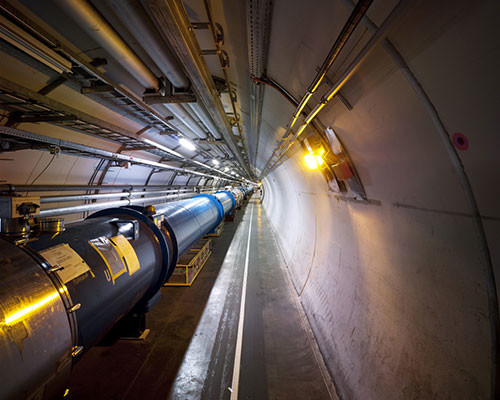
Gravity’s pull: could the LHC be used as a giant rain gauge? (Courtesy: CERN)
By James Dacey and Hamish Johnston
Today is Earth Day, so let’s temporarily rename this regular Red Folder column as the Green Folder. Either way, today we’re going to focus on the Earth and environmental issues. The official website of Earth Day – an initiative now in its 46th year – has details about the various initiatives and events taking place around the world today.
First, let’s pay tribute to a physicist whose work had a profound influence on the climate and energy debate in the UK and beyond. Sir David Mackay died on 14 April aged 48 following a battle with cancer. Mackay is remembered among other things for his pragmatic approach to energy and his 2008 book Sustainable Energy: Without the Hot Air (free access) was hailed for its rigour and refreshing absence of rhetoric. Mackay’s writings attracted the interest of the British government who appointed him as chief scientific adviser to the Department of Energy and Climate Change in 2009, a post he held for five years. Ever prolific, Mackay was blogging about his experiences right up until two days before his death.
Mackay believed that physics can play an important in role in humanity’s response to climate change, a view that is shared by the Perimeter Institute for Theoretical Physics (PI) in Canada. To celebrate Earth Day, the PI has suggested “Three ways physics could help save humanity”. The institute is also previewing a public lecture on 4 May featuring Tim Palmer of the University of Oxford, who will speak on “Climate change, chaos and inexact computing”.
Another scientist focused on finding workable solutions to decarbonization is Arpad Horvath of the University of California at Berkeley in the US. Horvath sits on the advisory board for Environmental Research Letters (ERL), a journal published by IOP Publishing, which also publishes Physics World. This week ERL published a video interview in which Horvath talks about what academic publishers can do to support the goals of the COP21 agreement reached in Paris in December. Horvath has a particular interest in designing “smart cities” that have low-carbon technologies and infrastructures. He believes that workable solutions will come from highly interdisciplinary teams, so academic publishers should do more to accommodate this type of research and make it accessible to decision makers.
Finally, there’s a nice article on the BBC website about how the Large Hadron Collider at CERN could be acting like a giant rain gauge. Getting protons to travel around the collider’s 27 km circumference is no easy task and CERN’s accelerator physicists have to ensure that tiny changes in the size of the LHC don’t send protons careering off course. This is done using an active feedback mechanism that adjusts the position of the proton beam in real time as in travels near light speed. It turns out that these adjustments provide an excellent record of external influences such as tidal forces and earthquakes, which affect the size and position of the LHC.
There is, however, an annual modulation of the size of the LHC that has left physicists and geologists scratching their heads. One possibility, according to geophysicist Rolf Hut of Delft University of Technology in the Netherlands, is that the gravitational force exerted by groundwater is affecting the LHC. In the summer there is less groundwater and the LHC can expand slightly, whereas in the winter the gravitational pull of the extra groundwater causes the LHC to contract. Hut is famous for coming up with innovative ways of measuring precipitation and he reckons the LHC could provide useful data about groundwater around Geneva.
The “Earth day” for its mostly man made existential problems and the curable but terrible hospital bed discomfort of Dr. David Mackay seem to be the “tipping points” in their own domains.